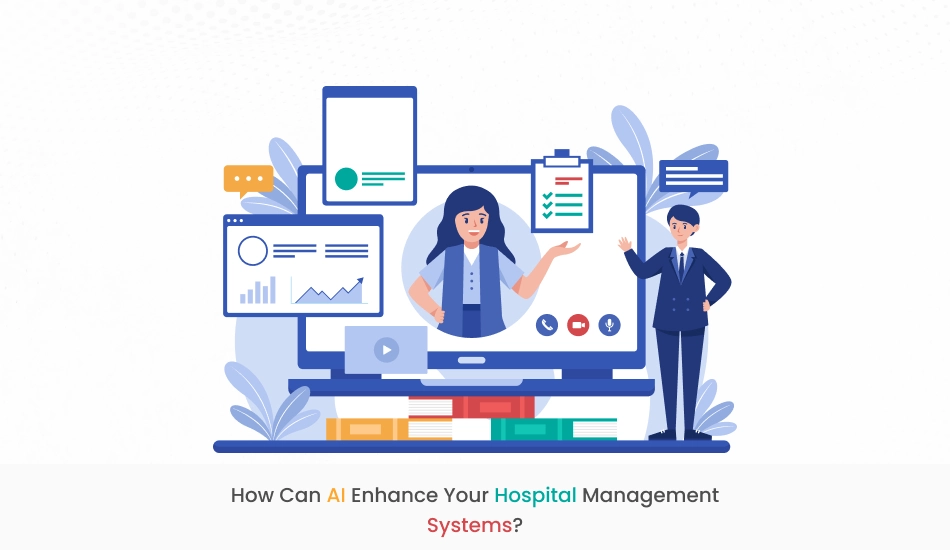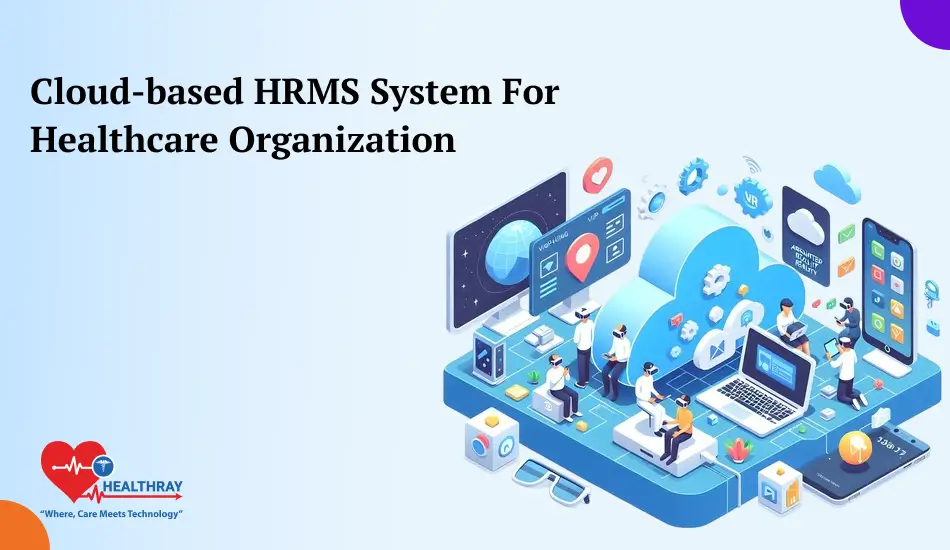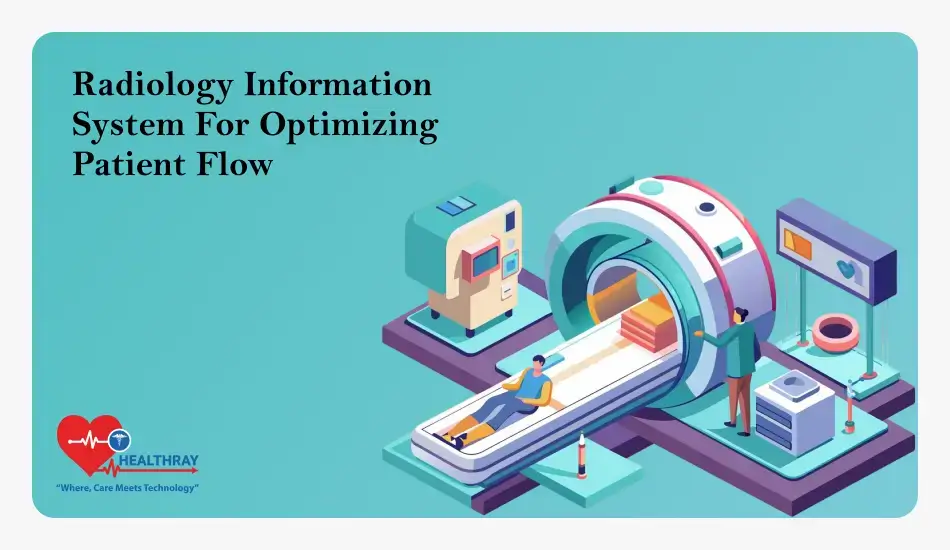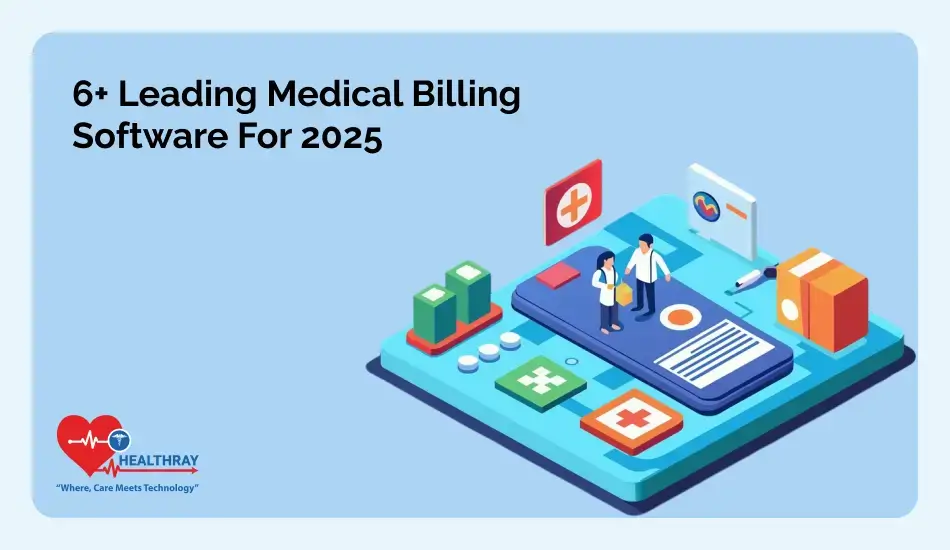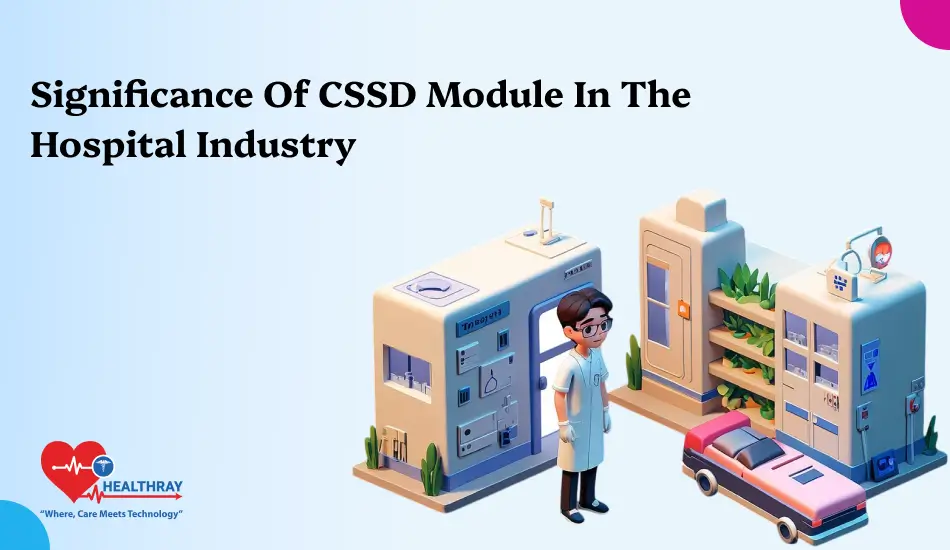Quick Summary
By enhancing patient care through predictive analytics and automation, optimizing resource allocation, and streamlining operations, artificial intelligence (AI) can improve hospital management systems and improve efficiency and results.
Introduction
In the healthcare industry, artificial intelligence (AI) is becoming more and more essential. Hence numerous healthcare institutions recognize the potential benefits of artificial intelligence (AI) in addressing a range of issues in the medical industry, including enhancing clinical decision-making, increasing operational effectiveness, and obtaining important information from large data sets.
The American Hospital Association stated in a recent Market Insights report that the use of AI technologies will significantly alter how work is done within forward-thinking hospitals in 5 years. Furthermore, according to research by HIMSS Media, 48% of healthcare companies plan to use AI to optimize administrative and clinical procedures, while 59% of organizations are already using AI to address operational inefficiencies.
AI in healthcare is the latest trends, not only attracts US patients, but also it is eye-catching for Indians due to the accuracy, clear reports, and easier process. In the healthcare organization, no one is interested in interior structure. They more prefer advanced, convenient, and speedy services. Additionally, the healthcare management system improves client workflow, expands services, extensive control on finances, and improves daily operations.
It is crucial now more than ever to achieve administrative and operational efficiency because hospital revenue margins are predicted to get progressively narrower. Moreover AI-enhanced robotic process automation and AI-powered solutions can save operating costs for hospitals and healthcare practices while increasing productivity, lowering errors, improving operational and clinical efficiency, and improving productivity.Hence let’s explore how hospital management systems can leverage benefits of AI.
Understanding hospital management systems
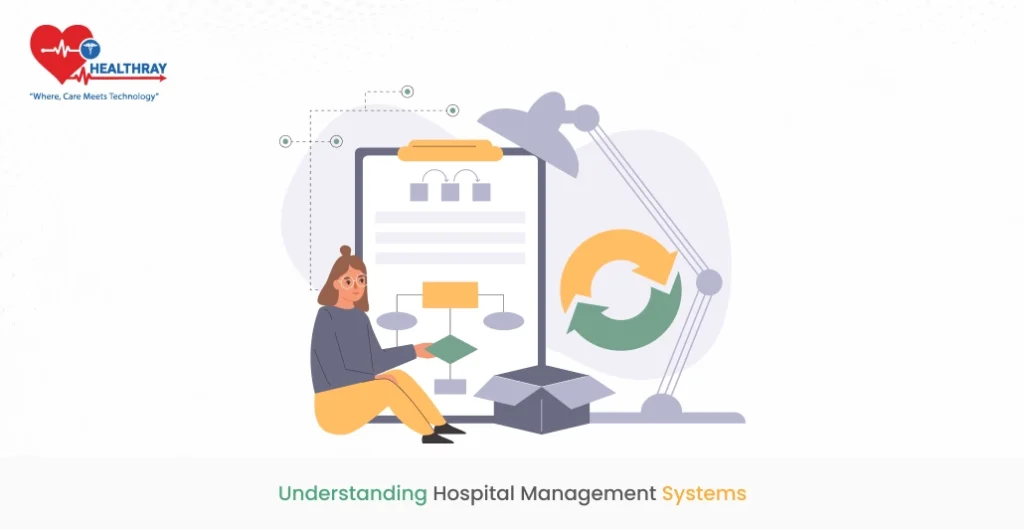
Hospital management systems(HMS) are all-inclusive programs made to unravel and computerize the distinctive operational, therapeutic charging, budgetary, and administrative commitments that develop in recuperating center settings. Hence comprehending hospital management systems requires an understanding of their different capacities, each of which is arranged to move forward persistent care, exactness, and effectiveness.
Any HMS’s basic quality is its capacity for smooth departmental integration. These systems act as a single point of contact for all recuperating center operations, covering everything from appointment planning and understanding to clinical data and organization to invoicing and inventory control. Therefore they make it less requesting for medical specialists to communicate with one another, guaranteeing to get to basic clinical information to begin with right decision-making.
A vital component of HMS is understanding the organization, which solidifies medical records in the certification, release, and enrollment procedures. Clinicians may rightfully get information with HMS’s electronic success and electronic health record (EHR) capacities, improvement in diagnosis and treatment organization. Also, these frameworks, as routinely as conceivable, have pharmaceutical organizations that are defiant and let sort in arrangements electronically, which brings down mistakes and propels medicine security.
Amplifies the rate of healthcare operations, unifies data at a single place, smoothly connects with instruments, increases communication with experts, and preserve information from outsiders. Furthermore, the healthcare information management system improves clinical performance, optimistic impacts on healthcare delivery, elevates the rate of income, and improves clinical revenue.
Hospital money-related organization is complicated and joins the salary revenue cycle management together, insurance claims organization, assurances, claim planning, and billing. Moreover by computerizing these methodologies, HMS maximizes pay collection and reduces charging goofs by making corrected bills, electronically submitting claims, and taking after installments.
HMS moreover incorporates stock and supply chain administration, which ensures the accessibility of essential medical facility restorative supplies while diminishing squandering and costs. Hence clinics and medical practitioners can avoid delays in understanding care and keep up perfect supply levels by utilizing stock following and programmed reordering systems.
Furthermore, analytics apparatuses are habitually coordinated into HMS, empowering chairpersons to extricate information from gigantic information sets and spot designs and make data-driven choices that upgrade operational adequacy and quiet outcomes.
The role of AI in hospital management systems
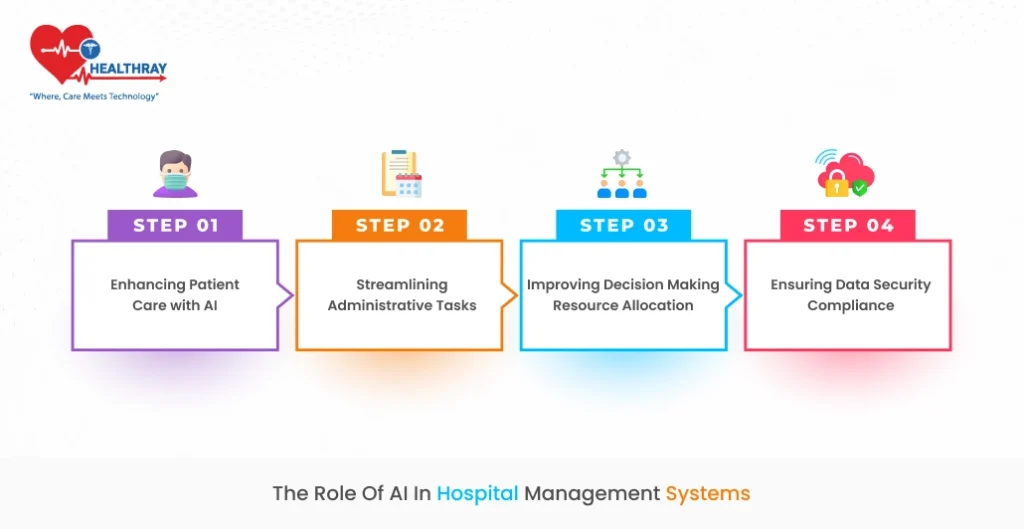
Enhancing Patient Care with AI
Artificial Intelligence (AI) is changing patient care by ensuring adequacy, exactness, and individualized care through the integration of AI into healing center organization frameworks. Hence AI-powered arrangements disentangle regulatory obligations in clinic programs like charging and arrangement planning, diminishing authoritative burdens for staff and permitting them to concentrate more on understanding care. AI can anticipate persistent confirmation rates through prescient analytics, which permits for more proficient staff planning and asset allocation.
Furthermore, by assessing colossal volumes of patient information to offer bits of knowledge and improve determination and treatment arranging, AI makes a difference in clinical decision-making. In order to offer assistance with early illness, distinguishing proof and preventive care strategies, machine learning calculations can distinguish patterns in understanding electronic health records.
Real-time quiet reconnaissance is made conceivable by AI-driven checking frameworks, which inform therapeutic faculty of any deviations from standard health indicators. Moreover, the patient management software reverses the approaches to patients, which intensifies efficiency and enhances patient satisfaction.
More functionalities are available on the hospital software. However, the major impact lies on patient care and their services. Advanced healthcare facilities create a systematic healthcare infrastructure that brings optimistic changes such as enhanced patient care, increasing patient safety, improved patient outcomes, and improved healthcare operations.
AI in Hospital Management Systems In Healthcare empowers medical experts to give prompt, exact, and patient-centred care. Moreover Artificial Intelligence (AI) in medical software improves hospital operations and treatment quality by computerizing tedious forms and advertising smart information, which inevitably improves patient results and fulfillment.
Digitizes patient records such as sensitive information, diagnosis reports, consultation notes, discharge papers, electronic prescriptions, and historical medical details. Moreover, the AI-based hospital management software system allows to retrieve clinical data of any date, remote monitoring from their home, virtual consultation from their feasible place, and reduces operational procedures. Therefore, it increases patient experience.
Streamlining Administrative Tasks
By culminating authoritative commitments, artificial intelligence ( AI) plays a crucial portion in frameworks that encourage productive operations and way superior patient care. Working out hospital management software can help with tasks like course of appointment planning, billing, and stock affiliation is a basic component. Traditions can modernize organizing to ensure advance prominent asset application and drop wait times by working out AI algorithms.
AI-powered predictive analytics can anticipate billing rates, allowing for the coordination of manpower and asset assignment between recouping centers. Through reducing swarming and capturing dynamic floodgate connection, this forward-thinking paradigm surely advances patient fulfillment. AI-powered chatbots and virtual assistants can handle inquiries, plan updates, digitize excellent records, and provide automated support, freeing up professionals to focus on helping with preliminary tasks.
Automating routine tasks has been executed with the power of AI intelligence in the medical industry. Furthermore, it includes a medical billing template, stores patient records, generates visual reports, and corrects errors.
Through the application of Natural Language Processing( NLP), these frameworks are appropriate to comprehend understanding requests and privilege and supportive reactions. Fundamentally, the union of artificial intelligence (AI) into clinic affiliation frameworks not as it were streamlines official commitments but too moves forward decision-making, asset spread, and by broad useful reasonability, all of which lead to made strides healthcare course of activity.
Improving Decision Making and Resource Allocation
Artificial intelligence (AI) is a key component that is changing hospital management systems through overpowering decision-making and more beneficial utilization of assets. AI gives healthcare providers the capacity to rapidly make well-informed choices through advanced calculations and information analytics. Analyzing large-scale chosen information is utilizing AI-driven prescient models, which can recognize conceivable dangers, figure calm comes around, and lock in early degradation identification.
AI also makes refinements in the scrambling of assets. It does this by examining and understanding certifications, planning, obliging supportive staff in an idealized world, and appropriately arranging stock. Artificial intelligence (AI) can gauge requests for pleasing supplies. It does this by looking over real-time inputs and past information. This guarantees pleasing stock levels and reduces waste.
Hospital directors can take advantage of AI-enabled decision support frameworks in expansion. This is especially useful when it comes to critical planning, checking office development, and improvement meanders. These systems offer assistance administrators in managing assets capably. They adjust to the ever-changing needs of the healthcare industry by advancing data-driven bits of data.
Essentially, Artificial intelligence (AI) locks in recovering center organization success frameworks, to make data-driven choices, which propels driving forward comes generally, operational reasonability, pay cycle organization, and asset capability in the healthcare industry.
Ensuring Data Security and Compliance
Artificial intelligence (AI) is pivotal to ensuring information security and definitive compliance in progressed clinic organization frameworks. Artificial intelligence (AI) fortifies the security of dubious calm information. It utilizes modern algorithms to recognize inconsistencies and possible security breaches in real time.
AI-driven encryption methods strengthen information transmission and capacity security. They do this by checking layers of security against cyberattacks and undesirable access to electronic health and medical records.
AI makes qualifications with compliance endeavors. It follows tireless records and analyzes colossal volumes of information. This ensures laws like GDPR and HIPAA are followed. Artificial intelligence (AI) helps recover center chairmen rapidly by addressing issues. It also assists in coordinating risks by quickly aggravating any deviations or non-compliance issues. Additionally, the healthcare management system improves patient results, reduces repetitive activities, increases output rate, and augments security.
AI-powered courses of activity in expansion engage the creation of genuine reports for definitive bodies by streamlining looking into procedures. A hospital management system may center on giving high-quality patient care. It can also scatter assets more effectively by automating order compliance chores. This integration of AI into clinic management systems enhances data security. It also strengthens compliance with legal regulations. This fosters confidence and trust in healthcare organizations.
How do we overcome challenges in AI adoption?
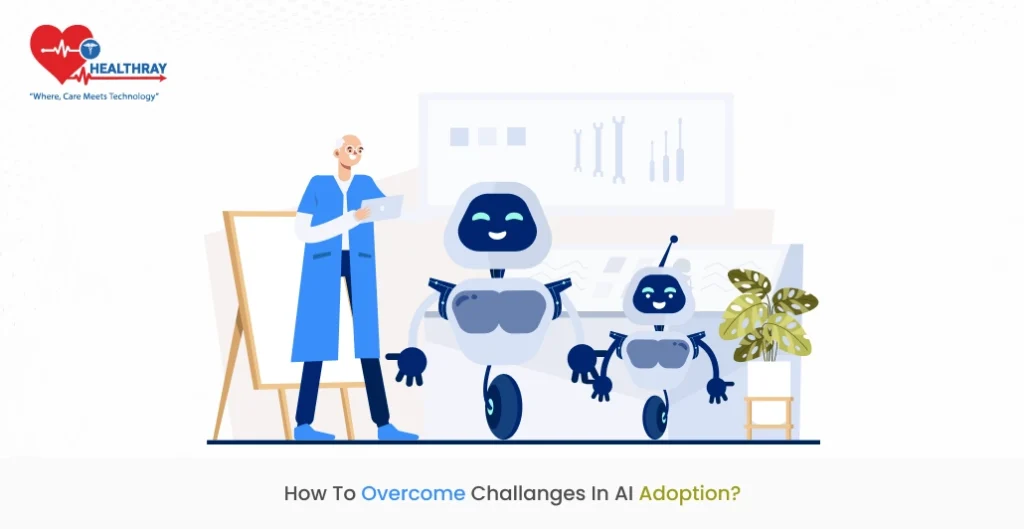
Education and Training
Implementing broad education and creating programs is the to begin with step toward breaking through AI determination obstructions. Begin by guideline workers on the fundamental concepts, devices, and application of Artificial intelligence. By going to charming organizational needs through program customization, develop a culture of persistent learning. Encourage real-world intuition through role-plays, workshops, and veritable ventures.
Take part in specialized preparation to secure information or abilities in areas pertinent to fabricated bits of knowledge. When executing AI, raise the esteem of ethical and data-literate choices. Collaborate with pioneers in the areas of commerce.
Stay up to date on improvements in your field through mental instruction. Hence companies may get ready their laborers to handle the obstacles related to the course of AI effectively. You can achieve this by providing the requirement for planning and instruction.
Data Quality and Accessibility
Getting AI comes with challenges. These challenges require deliberate overcoming, particularly those related to the accessibility and caliber of data. Begin by diminishing inclinations by affirming that the data sources are precise, total, and tried and true. Build up information management systems to ensure quality all through the AI lifecycle.
Energize departmental participation by cultivating an open and information-literate corporate culture. Contribute in a solid data establishment and headways to guarantee consistent data integration and recuperation. To extract information from different information sets, apply progressed analytics and machine learning computations.
Assess and overhaul information strategies based on a standard presumption to adjust to billing needs. To diminish threats and develop conviction, grasp ethical and clear practices.
Digital healthcare solutions improve clinical information and effectively apply guidelines, reduce legal costs and minimize unnecessary labor. It is important to choose reliable information while recording it. With a bit of challenge, it provides a greatest advantage to seamless data exchange and efficient management of clinical information.
Interdisciplinary Collaboration
To expel impediments to AI choice, it is fundamental to create interesting participation. Set up workable channels of communication among the different organizations that incorporate space aces, engineers, data analysts, and ethicists to begin with. early trade of information and common understanding of goals and limitations.
Accept a creative, curious, and dynamic society that respects differing qualities in considering. Contributing cash in cross-training works out to fill up ability holes and energize all encompassing approaches to problem-solving.
Moreover when creating AI, make duty and straightforwardness a best need. Guarantee that moral contemplations are taken into account at each level of the company. By developing interesting collaboration, organizations can oversee complex circumstances and progress the utilization of AI.
Ethical Guidelines and Governance
It will be troublesome to get AI, but it will require strict administration and ethical rules. To begin with, establish clear moral rules. These rules should emphasize reasonableness, straightforwardness, and duty throughout the AI application.
An intensive chance assessment and control strategies are necessary to address inclinations and impacts. In the interim, one should establish authoritative systems. These systems should advance association from all sides and ensure compliance with controls.
Help in progressing instruction and getting ready to increment mindfulness of secure utilization and progress AI instruction. Organizations can handle troublesome circumstances. They can choose the conviction of accomplices. They can progress the viable assignment of AI that benefits society as an aggregate by giving ethics and organization needs.
Start Small, Scale Gradually
AI adoption barriers can be overcome by beginning little and progressing over time. Begin by distinguishing particular issues or ranges where fake data can be valuable. Choose an extent with reasonable objectives and quantifiable measurements. Look for back from important parties and set aside sufficient stores for planning and utilization. Collaborate with cross-functional groups to ensure courses of action and resolve issues. Proceed and survey ceaselessly in reaction to input and results.
Hence, create AI projects slowly as they demonstrate productivity, utilizing the information picked up and growing upon the current establishment. Put a solid accentuation on adaptability and agility in order to react to advancing needs and imaginative breakthroughs. It will advance an imaginative and progressing move in culture.
Conclusion
The integration of AI into hospital management systems offers a large number of benefits that can revolutionize healthcare conveyance. Hospitals can streamline operations and improve patient results by tackling AI-powered advances such as predictive analytics, natural language processing, and machine learning. They can also optimize resource utilization through these technologies. Moreover AI-enabled tools can encourage more precise analysis and personalized treatment plans. They can also facilitate proactive interventions, ultimately upgrading the quality of care and quiet satisfaction.
Furthermore, AI can computerize scheduled regulatory errands. It can reduce errors and increase efficiency, allowing healthcare professionals to focus on more complex and value-added activities. AI-driven experiences are inferred from endless sums of information. They can educate vital decision-making and asset allotment. Hence this leads to more viable healthcare management practices, including practice administration program and approach detailing.
However, effective execution requires cautious arranging, collaboration, and venture in foundation, preparing, and information governance. Hospitals must address moral considerations, security concerns, and regulatory necessities. Hence this guarantees mindful and ethical AI adoption. Leveraging AI in hospital management systems holds colossal potential. It can change healthcare conveyance, drive advancement, and improve health outcomes for patients universally.
